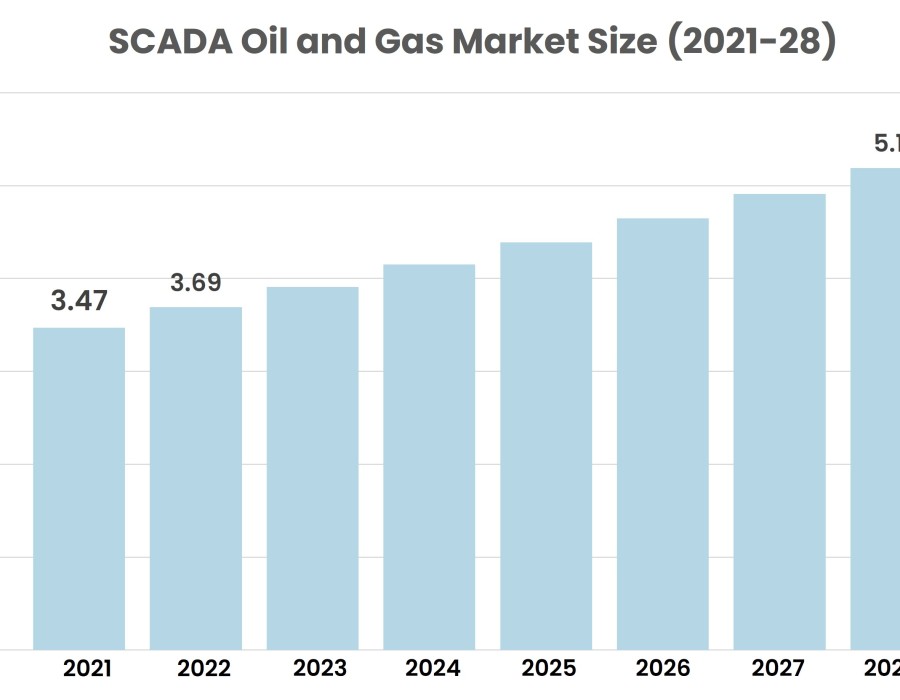According to Stratview Research, the SCADA oil and gas market was estimated at USD 3.47 billion in 2021 and is likely to grow at a CAGR of 5.85% during 2022-2028 to reach USD 5.19 billion in 2028.
In the vast and complex world of oil and gas, precision and efficiency are paramount. Every component, every operation, and every decision can have far-reaching consequences. To maintain control, monitor critical processes, and make informed choices, the industry has turned to advanced technologies. At the heart of this digital transformation lies the Supervisory Control and Data Acquisition (SCADA) system, a digital pulse that has revolutionized how the oil and gas sector operates. In this article, we embark on a journey to explore the SCADA market and understand how it has become the lifeline of this vital industry.
Understanding SCADA in Oil and Gas
SCADA systems are the nerve centers that oversee and manage the vast, intricate, and often remote operations in the oil and gas sector. These systems are designed to provide real-time monitoring, data acquisition, and control of equipment and processes, making them indispensable tools for ensuring safety, efficiency, and reliability in this high-stakes industry.
The Significance of SCADA in Oil and Gas
The use of SCADA systems in oil and gas operations offers numerous advantages:
Real-Time Monitoring: SCADA systems provide instantaneous data on the status of equipment and processes, enabling operators to identify and address issues promptly.
Remote Operations: With the capability to control and monitor operations remotely, SCADA minimizes the need for on-site staff in hazardous and remote locations, improving safety and reducing operational costs.
Data Analysis: SCADA systems collect vast amounts of data, which can be analyzed to improve operational efficiency, predict maintenance needs, and optimize performance.
Safety and Security: The ability to detect anomalies and respond swiftly to safety issues is crucial in the oil and gas industry, making SCADA systems essential for accident prevention and mitigation.
Energy Efficiency: SCADA systems help in optimizing energy consumption and reducing environmental impact.
Applications Across the Oil and Gas Sector
SCADA is extensively used in various oil and gas operations, including:
Upstream Exploration and Production: Monitoring drilling operations, wellhead control, and reservoir management.
Midstream Transportation and Storage: Managing pipelines, compressors, and storage facilities for efficient transportation and storage of crude oil and natural gas.
Downstream Refining and Distribution: Overseeing the refining processes and ensuring the efficient distribution of refined products to consumers.
Environmental Compliance: Monitoring emissions and ensuring adherence to environmental regulations.
Innovations in the SCADA Market
The SCADA market has seen substantial advancements:
Integration with IoT: The Internet of Things (IoT) has transformed SCADA systems, allowing them to connect with a broader range of devices and sensors for enhanced data collection and control.
Cloud-Based Solutions: Cloud technology has made it easier to manage and analyze the vast amount of data generated by SCADA systems.
Cybersecurity: With the increasing risk of cyber threats, SCADA systems have evolved to incorporate robust security measures to protect critical infrastructure.
Predictive Analytics: SCADA data is now leveraged for predictive analytics, which can anticipate equipment failures and optimize maintenance schedules.
The Future of SCADA in Oil and Gas
As the oil and gas industry continues to evolve, so does the role of SCADA systems. The future of SCADA in this sector holds exciting potential:
AI and Machine Learning: The integration of artificial intelligence and machine learning will enable more sophisticated data analysis and predictive maintenance.
Energy Transition: As the industry shifts toward renewable energy sources, SCADA systems will play a pivotal role in monitoring and managing these new assets.
Global Expansion: The application of SCADA systems is expanding globally, including in emerging markets, as the need for efficient energy management grows.
In conclusion, the SCADA market in the oil and gas industry is much more than just technology; it's the digital heartbeat that ensures safe, efficient, and sustainable operations. As the sector faces evolving challenges and opportunities, SCADA systems will remain at the forefront, providing the crucial insight and control needed to navigate the ever-changing landscape of the oil and gas industry.






Comments